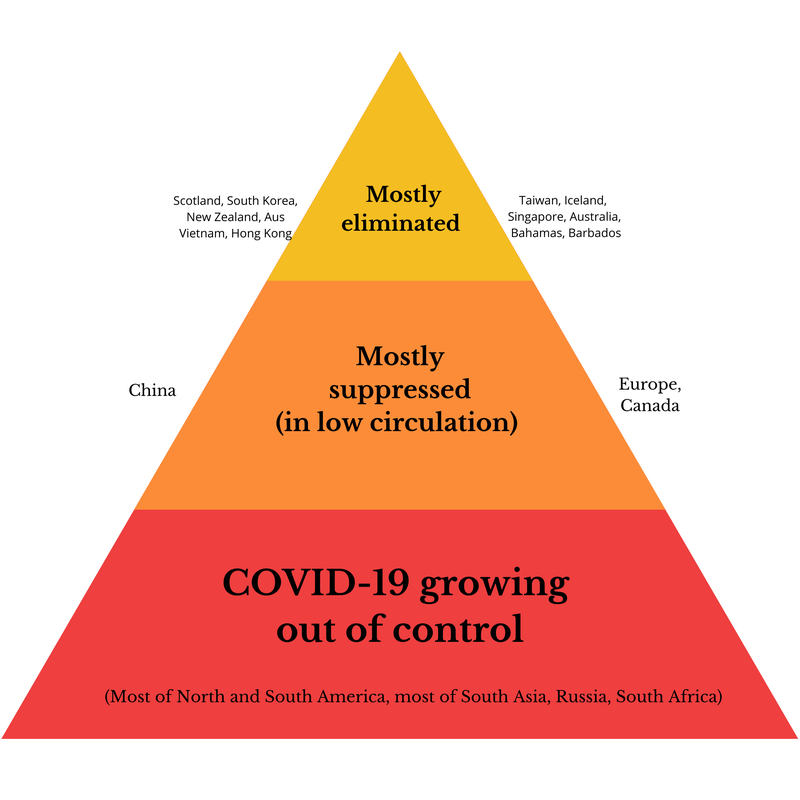The media want us to believe that we are on the path to recovery. But keeping a lid on the virus will exact a huge economic toll.
As most of the world comes out of lockdown, a lot of people think the pandemic is behind us. That we have seen the worst of it. A recent claim by the Daily Telegraph that “normality edges closer” is a common view. But it is also a fantasy. It increasingly looks like the opposite is true. This… is just the end of the beginning.
I’m not an expert on diseases or a scientist. I’m merely a journalist. Part of my job is to read the news and join the dots. And right now those joined-up dots paint a picture many seem to be missing.
For a start, although Europe and East Asia have so far managed to suppress the coronavirus, across most of the world it is spiralling out of control.
In the United States, it’s roaring back in big states such as Florida, Texas, California and Arizona. But since the initial lockdowns caused such unprecedented economic chaos, it’s highly unlikely states will opt for that again. And Trump will fight hard against more lockdowns.
From our partners:
But the US isn’t alone. Brazil now has the second highest death toll in the world and a President who doesn’t care for it. Mexico’s President has repeatedly behaved irresponsibly and Peru and Ecuador have among the highest rates of infections in the world. The situation in South Asia is even worse. India is the third-worst affected country in the world and its Prime Minister, Narendra Modi, ended the poorly-planned lockdown just as infections started exploding.
It’s true that rising infection numbers are partly down to more testing. Plus, doctors have become better at treating it. But the number of people dying from COVID-19 is only half its peak in April and they are going up again.
The world is now effectively split into three tiers: the lowest tier, where COVID-19 is out of control; the middle-tier, where it’s in low circulation and the top-tier, where it’s almost eliminated.

Around 90% of the world lives in the bottom two tiers. It goes without saying it will prove extremely difficult to put the genie back in the bottle without a vaccine or much better international coordination.
Living with COVID-19 won’t be easy either
Secondly, we can’t declare victory against the coronavirus just by surviving it. We needed to eliminate it. Last week Taiwan started hosting normal baseball games again, with no social distancing required. It’s last reported death from COVID-19 was in mid-May. Only seven people have died from the virus in total there. This is what elimination looks like.
The popular view in the English media is that we’ll recover providing there isn’t a second wave of the virus. That is a deeply panglossian view. The problem isn’t just we will get a second wave – most countries have had one – it’s that trying to keep a lid on the virus will exact a huge economic toll too.
Hong Kong has had to close all its schools again. Melbourne has gone back into lockdown. Tokyo is paying its nightclubs to close after recording a jump in infections. If countries that had almost eliminated the virus – and take masks and social distancing seriously – are having trouble keeping it under control, what hope does Europe have?
For one, we will have to restrict travel with countries where the virus is out of control. The EU is already restricting flights from large parts of the world. Other countries are likely to do the same.
Older and vulnerable people will have to live in semi-isolation for longer. The risk of infection and death will be too high for them. The toll this will take on their well-being and mental health is incalculable.
It will also cost an unprecedented number of jobs. Many small businesses that earlier survived on low margins will go bankrupt from social-distancing requirements. A lot of restaurants, clubs, pubs, bars, theatres, cinemas, travel companies, live events and mass entertainment organisers won’t be financially viable anymore. Even many big companies won’t be able to survive the chaos and reduced margins. Britain saw 12,000 jobs lost in just one day this month. There will be many more job losses.
In the midst of a tsunami that can be seen a mile off, Britain is having an absurdly timid debate about deficits and tax-rises when an unprecedented number of jobs are about to be destroyed.
In the US, the number of ‘permanent’ job losses jumped by over 1.6 million in four months. It took eleven months to reach that number last time in 2008. As we come out of lockdown and furlough schemes come to an end, those job losses will soar. Companies that provide support to other companies will go bust. People will spend less in fear of losing their jobs. All this will further depress the economy.
The US has so far pumped over $2 trillion into the economy and it has not stopped it from sliding. Germany, which has always done a better job in recognising the scale of the challenge right from the start, unveiled a €130bn coronavirus recovery package. The UK’s offering is barely a quarter of that: £30 billion. Rishi Sunak will almost certainly have to do a lot more.
It would be criminal to say this is merely how the market works and dismiss the job losses as ‘creative destruction’. Doing little would deepen the recession and destroy millions of lives. Nothing else matters than the creation of new jobs financed by government borrowing. The pandemic has illustrated how fragile our economy was.
We reacted too slowly when the coronavirus landed on our shores and we paid the price. We cannot make the same mistake again or the impact will be felt for decades to come.
This article is republished from openDemocracy.













